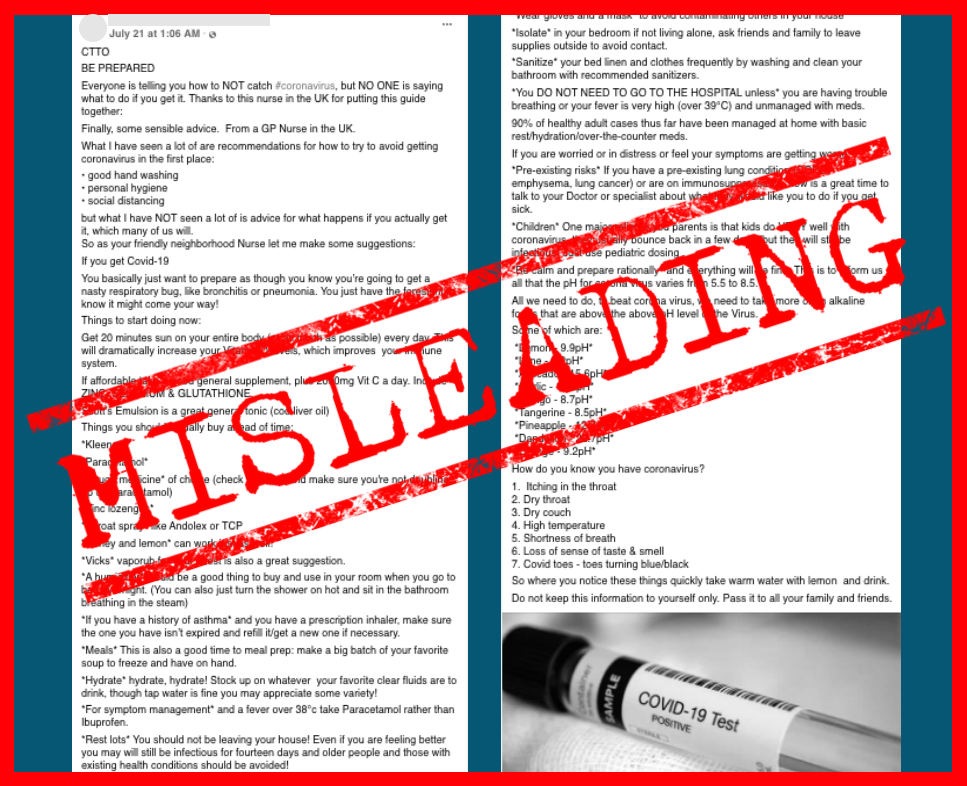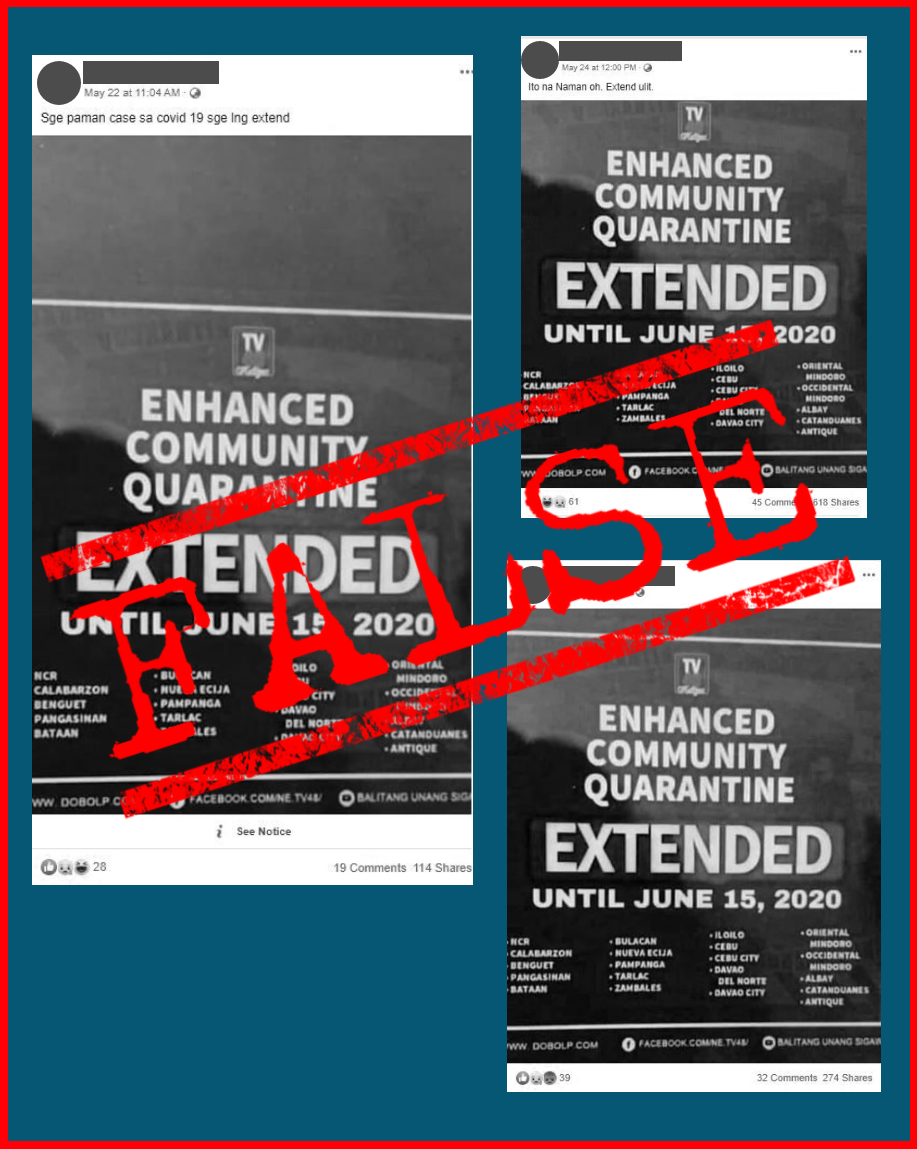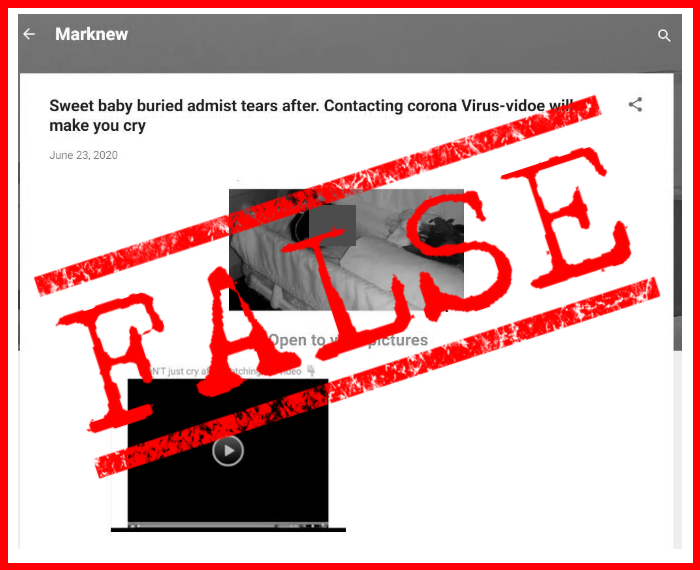A widely-shared Facebook post that gives advice on what to do if one contracts COVID-19 is misleading. It mixes correct health advice with recycled false claims and information that need context.
The inaccurate post is attributed to an unnamed nurse in the United Kingdom (UK). It bears the following: recommended measures to prevent infection, what to do when one “actually gets” the disease, advice about eating food with a pH level “higher than the virus” to beat COVID-19, and tell-tale symptoms of the disease.
The post carries sound advice on preventive measures against COVID-19, such as good hand-washing, personal hygiene and social distancing, which are also recommended by the World Health Organization (WHO), Department of Health (DOH) and other health authorities.
Advice on what to do if one gets COVID-19, which makes up the bulk of the post, includes getting sunlight to boost one’s immune system, and taking supplements such as Vitamin C, zinc, selenium and glutathione and a tonic called Scott’s Emulsion.
In a previous fact check by VERA Files, WHO Philippines said taking vitamins and exposure to sunlight will not kill SARS-CoV-2. A July 27 fact check article by East Africa-based organization Pesa Check also disproved a related claim that Scott’s Emulsion can provide immunity against the disease.
However, a WHO representative did tell Pesa Check that although no food or diet can prevent or cure the disease, “healthy dietary supplements containing micronutrients and vitamins” were “important” in helping boost one’s immune system which can fight the virus and other respiratory illnesses.

The post also claims children “do VERY well with coronavirus” and usually bounce back in a few days. This needs context. According to a WHO Q&A; on COVID-19 and the youth: “Evidence to date suggests that children and adolescents are less likely to get severe disease, but severe cases and death can still happen in these age groups.”
The rest of the advice on dealing with COVID-19 infections includes general tips to help with symptom management such as setting up a humidifier and preparing over-the-counter medicine like paracetamol, pre-made meals, drinking lots of liquids, and taking a rest.
It also included WHO-backed advice on self-isolation when one only has mild symptoms, and contacting healthcare professionals if a person has trouble breathing.
Part of the post about highly-alkaline food is false. This circulated as a stand-alone claim on social media in July. (See: VERA FILES FACT CHECK: A high-alkaline diet DOES NOT ‘defeat’ COVID-19)
According to public health experts, there is no evidence that eating alkaline food is related to an increased or decreased risk of COVID-19 infection. Viruses also do not have pH levels. Additionally, the currently circulating post also carried the same list of foods all bearing the wrong pH values from the old posts.
The post gave an itemized list of symptoms of COVID-19: an itchy and dry throat, a dry couch (sic), high temperature, shortness of breath, loss of taste and smell, and blue or black toes. This needs context.
The WHO has noted that dry cough and fever are common symptoms of the disease, while “loss of taste or smell or a rash on skin or discoloration of fingers or toes” are “less common” manifestations and may affect only some people. More severe symptoms such as difficulty breathing is estimated to affect only one in every five COVID-19 infections.
DOH also said some people may not at all show symptoms or feel unwell.
The misleading post appears to be an evolved version of an advisory that has been making the rounds on FB since March 12. However, the older post did not carry the last two claims about a high-alkaline diet and tell-tale symptoms. It was likewise attributed to a nurse, although it did not say that the nurse was from the UK.
At least two Filipino netizens have published the misleading FB status update, one on July 21 and another on Aug. 13. They collectively have been shared over 12,000 times and have received more than 3,600 comments.
The post continues to be shared as the DOH recorded 217,396 cases of COVID-19, as of Aug. 30., of which 56,473 are active.
(Editor’s Note: VERA Files has partnered with Facebook to fight the spread of disinformation. Find out more about this partnership and our methodology.)





